Perestroika is like an airplane that takes off without knowing where it will land. (Bondarev)
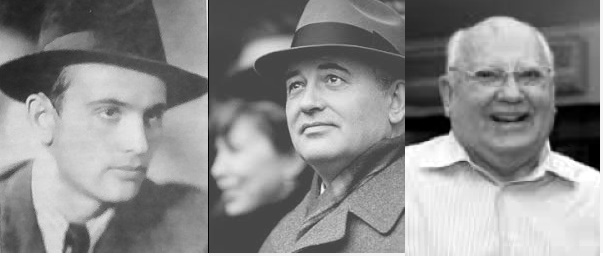
Reading Taubman’s exhaustive biography of Gorbachev, Mikhail Sergeevich, I was rivetted time and again, marvelling (as did Shultz and everyone who cared): how did this guy get from collective farm winner of the Red Banner of Labour to the top? My first question in reading a bio is ‘would I like to have this person as a friend?’, then ‘would I like to be him?’ Gorbachev gets a firm Nyet on both. But he’s important and pleasant, and this 700-page bio is full of real characters acting out a drama of Shakespearian dimensions.
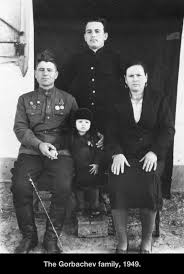 Gorbachev had everything going for him. Great family (both kulak and dekulakizer as grandparents, both arrested, a year or so in Siberia, survived!), wonderful father (I would definitely like Sergei Andreevitch and can imagine being him, a collective farm chairman, shepherding my flock through the many travails of Soviet life.) I could do with a lot fewer travails, but Sergei was warm, sincere, a stalwart fighter in WWII, who romantically had another son 15 years after Mikhail in 1946.* Mikhail Sergeevich pushed his way to the top early, going to Moscow State University (MGU) in 1952-5, an entree to the elite, experiencing the excitement of the 20th Congress. But Mikhail Sergeevitch (MS) was, sorry to say, a drip, the teacher’s pet. Straight As, Red Banner of Labor, komsomol activist who really believed in communism. Until he didn't. The more I read, the worse I thought of him. Was he merely confused, bumbling, ignorant, or was he, in Deng Xiaoping’s characterization, an idiot? By page 694 (whew!) I was no longer in doubt.
Gorbachev had everything going for him. Great family (both kulak and dekulakizer as grandparents, both arrested, a year or so in Siberia, survived!), wonderful father (I would definitely like Sergei Andreevitch and can imagine being him, a collective farm chairman, shepherding my flock through the many travails of Soviet life.) I could do with a lot fewer travails, but Sergei was warm, sincere, a stalwart fighter in WWII, who romantically had another son 15 years after Mikhail in 1946.* Mikhail Sergeevich pushed his way to the top early, going to Moscow State University (MGU) in 1952-5, an entree to the elite, experiencing the excitement of the 20th Congress. But Mikhail Sergeevitch (MS) was, sorry to say, a drip, the teacher’s pet. Straight As, Red Banner of Labor, komsomol activist who really believed in communism. Until he didn't. The more I read, the worse I thought of him. Was he merely confused, bumbling, ignorant, or was he, in Deng Xiaoping’s characterization, an idiot? By page 694 (whew!) I was no longer in doubt.
1991 was the Soviet Union's 9/11. With all the smoking guns you could ask for. MS was a Manchurian Candidate, a brainwashed enemy agent, intent on destroying socialism from within. Perhaps MS's true desires were all buried on his unconscious, like Shaw, the original Manchurian Candidate.
Was it the 30s arrests of his grandparents that inspired him to launch his flight into the unknown? (but they survived, and even the kulak Andrei joined the collective farm and was put in charge of the pigs, a task he soon turned into the model pig farm in Stavropol region and earned awards). Others fared far worse, and, suddenly release from prison, fought in the 'great patriotic war', and loved their motherland, despite the shortcomings of communism.
Was it the ferment of life at MGU and his brief stint working for the Procurator's Office in 1955 rehabilitating purge victims? MS graduated that year, his research paper on the advantages of socialist democracy over bourgeois democracy.
Or was it reading the secret speech of Khrushchev at the 20th Congress as a 20-something (party members were allowed to read it), and following the career of his friend Zdenek Mlynar, who would become the boy genius of the Czech Spring a decade later?** Or was it when MS had toadied himself into Andropov's graces and won the jackpot, joining the Central Committee in Moscow in 1978, arrived and found a bunch of sclerotic seniors, with not a friendly face in the bunch, except for MS's beloved Yuri Vladimirovich. But when he tried to rekindle their Caucasus dacha fun in grey, somber Moscow, with the Soviet Union in deep freeze stagnation, YV told him: don't phone and don't try to meet me one-one-one. The others will talk.
Or was it as late as 1985, when MS started his life as windbag-in-chief, presiding over a system that needed radical, tough reforms, where chips would fly and nomenklatura egos and privileges would lose big time, something MS was incapable of doing. This was no komsomol frolic, or Great Stavropol Canal, for which Leonid Iliich awarded him an October Revolution medal, his ticket to the Central Committee in 1978. (It coincidentally passed near Andropov's hometown).
It’s clear he was already planning (in as much as he 'planned' anything from then on) for the collapse. After 1985 ‘I ceased to believe this [reform].’ He saw 1985 = 1921 NEP = 1968 Czechoslovakia, and that he had to go against party precepts and carry out his former friend Mlynar’s project, now for the entire socialist world. At Chernenko’s funeral, he met with the Italian eurocommunist. Soon-to-be-retired Central Committee Secretary Ponomarev complained to MS aide Chernyaev: he received only the Italians, the ‘bad’ ones.***
Already by 1987 MS was planning to transform the Communist Party into a ‘normal’ party, dreaming of a two-party system, like his beloved US Republicrats. So Gorby, what’s the plan if the opposition wins and decides to dismantle socialism? That’s what’s happening at this very moment in Venezuela. Do you play by Queensberry rules, take defeat gracefully and disappear?
You are kidding no one. You saw the party as a mere ghost organization, populated by Gogolian dead souls, with toadies like you at the bottom, and stagnating dinosaurs at the top. You really intended on setting it up for a fall, putting the bull Yeltsin in the china shop, and letting hell break loose. It certainly worked.
I remember my first glimpses of MS on the news in 1985. He seemed too good to be true -- young, smiling, even laughing, friendly. That's not what a gen-sec looks and acts like. But at the back of my mind, I thought, maybe that's for a reason. Communist leaders have a tough challenge and need to be tough, to discipline the ranks, take sometimes harsh measures to keep the rickety boat afloat. Socialism is really, really hard to pull off. It goes against our greed instinct, and faces fierce loathing by the capitalist countries. It is not in their interests for it to succeed, and any relations East-West must bear that in mind. Venezuela is going through this right now. No love-ins with the US empire for them.
What was this nonsense of schmoozing with Thatcher and Reagan, two of the most odious politicians, whom he called his bosom buddies? I remember how devastated I was when Reagan was elected. I knew it meant the end of our post-WWII social democracy, a renewed, ever more aggressive US empire. The slick Hollywood capitalist puppet, slashing any remotely welfarish, massively increasing military spending, squashing Grenada and arming the vicious contras in Nicaragua, declaring the Soviet Union the evil empire. Hey! YOU are the evil empire. The Soviet Union was neither evil or an empire. Was MS discarding those truisms? Where would that lead?
Nonetheless, MS was good for the peace movement, and though it was a raw deal, the INF and the START treaties were signed and sailed through ratification (beware making deals with the Yanks, the ratification process means usually two presidents and carefully negotiated treaties (i.e., with Iran) often fail). US-Soviet relations had been in deep freeze since Carter. Okay, you always get a raw deal with the US, and all those bombs are ridiculous anyway, so chuck them.
And, to his credit, MS valiantly refused to condone Reagan’s Starwars SDI, which meant the dismantling of the Nixon-Brezhnev’s IBM treaty of 1972. Gorbachev insisted on continuing it, though Reagan went ahead and basically violated it. Bush II tore it up when SDI was closer to realization anyway. The classic US political sleight of hand: you spend 3 years negotiating with a US president, sign something if you’re lucky, only to find the piece of paper worthless when the next prez takes over. Pretend democracy. A bummer for all other nations, who really need the US to agree not to undermine their governments.
Unfortunately, that's about the limit of MS's positive effect on anything. Reading Taubman, I was astounded at all the silly, pompous travelling -- to conferences, signing ceremonies, gala dinners with Gregory Peck, Jane Fonda and other groupies, collecting presents (which Raisa diligently labelled and sent to some storage facility, no hint of corruption).He and Raisa were playing house! The man was destroying his country and glad-handing anonymous foreigners on pretty western streets, people who treated him like a rare interplanetary alien who the US-Britain had tamed.
Apart from his summer of tractor driving at 16, which earned him his coveted Red Banner of Labour, MS had never dirtied his fingers in real work, never been elected to anything. Yes, he went barnstorming in rural Stavropol as komsomol leader to visit his flock, though a cynic might add, necessary to rise through the ranks, great on a cv. The fact that we know of these timid attempts to help locals, that his 'activism' was featured in Stavropolskaya Pravda, suggests the cynic might have something.
MS's big hope was to revisit 1921, Lenin's New Economic Plan, fondly remembered in later times as a comic opera of bourzhui schemes to steal, forge, whatever, immortalized by Ilf and Petrov's 12 Chairs. The communists were portrayed as blockheads, uptight prudes, but at least honest and serious. The 20s were also years when avantgarde artists and writers also flourished.
Coops flourished. Little guys conjuring up commodities out of whatever, filling the many gaps in goods. But nostalgia for a century-old gimcracked past, what was in fact a breather before the great industrialization and collectivization drives of the 30s, is pie-in-the-sky. The products of the 20s were shoddier than even Soviet goods, and did nothing to prepare the country for war against the western foe, who had just been finally pushed out by 1921, and were bound to come back.
So MS got his Law on Enterprises in 1987. Did it bring elysium? Nyet. Workers used their new power to push for higher wages. Managers used the sudden absence of tight state control to benefit themselves, make profits by producing more expensive goods. Hey, sounds like our battles and myopia here. You don’t assume the ‘best case’ scenario. Always count on the worst case and be ready.
But no, it was so tempting to see what might happen. Going a step further than Bondarev, how about: Perestroika was like a 5 yr old with matches playing in a wooden house full of kindling. Or rather glasnost (openness), as there never really was any perestroika (restructuring). What if I just strike this match and warm my and everyone’s hands? It doesn't cost a kopeck, and everyone will notice.
End censorship. Simple. Look at how everyone is excited. 200 films from the censor's storage bin suddenly at the movie theatre. Repentance (1987), Assa (1988), Little Vera (1988). Bulgakov's Heart of a Dog (1925) ... Revelations each day. Scandals. No time to work. Time for a long, long history lesson. What?! Hello, yellow journalism/ tv, whipping up anger, provoking the collapse of law and order.
I jumped over hoops to get a job in Moscow, working for the now radical Moscow News, and writing subtitles for Mosfilm. Truly memorable, but unsettling. There was no hint of socialism in all this. Politically MS was giving Reagan, yes, horrible Reagan, everything he wanted, embracing him like in the movies, and even that wasn't enough. Reagan refused to stop US meddling in Afghanistan, continuing to arm the jihadists even as the last Soviet troops departed. What was going to happen if this all came crashing down?
'People needed glasnost because we haven’t given them anything else yet,' MS tells his doubting Politbureaucrats. Yes, talk is cheap. Intraparty schism? Play both sides, look for compromise? He bemoaned that Soviet history had been out of bounds. His still loyal aid Chernayev: Stalin sacrificed millions of soldiers by trying to appease Hitler, liquidated all who made the revolution and started socialism. But argued Ligachev, MS's most principled critic: Demeaning the past degraded people’s sacrifice and risked their wrath.
The other burning issue as you read, was there another way?
Could he have immediately begun firm economic reforms like China, and cushioned the transition? Buy off the apparatchiki, turning them into oligarchs, but within limits.
Two answers: No, collapse was necessary.
Yes, shock therapy was/is wrong, a disaster. First, loosen the manacles on managers to allow them to set reasonable targets, tighten up the consumption of alcohol (price increase, limits on sales and public consumption, NOT prohibition), a political shake-up in the party to get rid of excess bureaucracy, eventually dismantling the state planning system, privatizing only small production and service facilities, keep the 'glasnost' stuff for later, when the economy is stabilized. The Chinese model. Maybe it didn't need to go wholesale for capitalism, as the Chinese communist party seems to have done. In any case, Russia/ the Soviet Union would still be a superpower, a real superpower.
Though advisers urged adopting it, Gorby dismissed it, stuck in the long standing hostility to China. His visit to Beijing in 1989, where he was greeted by shouts of ‘Gorby’, was a farce. Demonstrations on Tiananmen Square were in full swing, and Gorbachev was hailed as their saviour. Boy was Deng Xiaoping mad. 'Gorbachev is an idiot,' he told his son, quoted by a US journalist in 1990. Unleashing political turmoil without resolute economic reforms.
MS had a huge ego, ‘his self-confidence was such that it didn’t let him admit that there was something he didn’t know or understand,’ said his prime minister Ryzhkov. But there was a whole lot he didn’t understand about what was most important -- economics. There was no program up his sleeve when he had the chance to implement changes in 1984.
The quintessential diplomat Gromyko could have been his key ally, restarting the 1964 reforms with some clout, but Gorbachev replaced him as foreign minister with Shevernadze, who had no real experience in foreign affairs. Gromyko soon became disillusioned with Andropov’s protege. He doesn’t succeed in finishing one thing before he latches onto another. He talks incessantly, can’t pick out what’s most important, and often repeats himself. … The Gorbachev he nominated as general secretary in 1985 and the current Gorbachev were ‘two entirely different people, Gromyko told his son after reading the Andreyeva article in 1988.****
The situation was dire in 1984, but China faced a similar abyss and was able to climb out of it.
Deng Xiaoping hit the nail. He remembered his nemesis Mao's 'Let a hundred flowers blossom' campaign, begun a month before the 20th Congress of the CPSU. Mao wasn't an idiot. He was at the peak of power in 1956, but needed a gimmick to isolate the anti-regime elements. Mao and Khrushchev were night and day. Nikita Sergeevich had just exploded his own 'hundred blossoms' campaign, denouncing Stalin, which led to the schism with Mao. It looks like Mao was testing the waters at home, not to promote glasnost, but to expose troublemakers and contain them. It worked and 'rightists' (bourgeois) who were idiots and spoke out were rounded up. Deng got off lightly but learned a vital lesson of politics: Don't start something you can't contain or you reap the whirlwind.
MS must have intended to let his 'rightists' (the Stalinists) hang themselves. Mao's strategy, but for the opposite ends. Only an idiot could have thought his unplanned, illogical, incompetent actions would magically result in a new robust socialism. He knew there was widespread discontent. You didn't need to be a rocket scientist to know that, 'hundred flowers' or no 'hundred flowers'. Ditto Stalin's crimes and whatever else was dredged up. He, the whole country, needed to be focused, fanatical (like his beloved Lenin, who he read and reread throughout his life, especially the final testament, where Lenin starts to lose faith in Stalin and the whole enterprise). No pain, no gain. No 'glasnost' till you have your head above water. Keeping control of the whirlwind.
Gorby was hailed as another Woodrow Wilson (14 points, 1918) and FDR/ Churchill (Atlantic Charter, 1941). As his electoral victory present to Bush, he used his UN speech in 1988 to offer to reduce Soviet troops by 500,000.
Sorry, Gorbachev was a terrible leader, reminiscent of Canada's Lester Pearson, a bumbling well-meaning goodie two-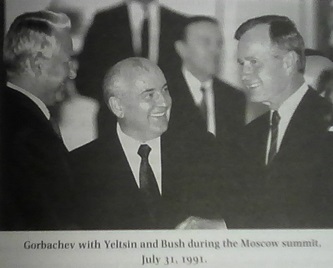 shoes diplo, who fell into the leadership with his shiny Nobel Peace Prize, with no political skills. Pearson was a laughing stock to his cabinet who behaved like brats, but there were no existential struggles at play. Still, he is fondly remember for introducing Medicare over the furious opposition of the medical establishment. Socialism is never easy, but when you prevail, the people love you. What did Gorbachev bring? Capitalism? Yuck. No wonder he is loathed by Russians.
shoes diplo, who fell into the leadership with his shiny Nobel Peace Prize, with no political skills. Pearson was a laughing stock to his cabinet who behaved like brats, but there were no existential struggles at play. Still, he is fondly remember for introducing Medicare over the furious opposition of the medical establishment. Socialism is never easy, but when you prevail, the people love you. What did Gorbachev bring? Capitalism? Yuck. No wonder he is loathed by Russians.
It's hard not to experience a bit of schadenfreude at Yeltsin's vicious hounding of Gorbachev, especially after the 1991 coup, especially after everyone stopped listening to Mr Windbag. Even after he deposed, he kept at it, finally running in the 1995 presidential election. MS got 0.5% of the overall vote, placing seventh out of eleven candidates. He finally got the hint and disappeared.
Who looks good in retrospect?
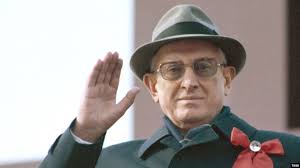 Andropov? A mixed record. He promoted reformist Kadar in Hungary after 1956. Conceited and brilliant. So feared by his Politburo colleagues they made him head of the KGB, hoping that would put him out of the running. But he was the only one who was competent and had the balls to actually do anything. Many bad promotions (i.e., MS) but also Ryzhkov.
Andropov? A mixed record. He promoted reformist Kadar in Hungary after 1956. Conceited and brilliant. So feared by his Politburo colleagues they made him head of the KGB, hoping that would put him out of the running. But he was the only one who was competent and had the balls to actually do anything. Many bad promotions (i.e., MS) but also Ryzhkov.
The gerontocrats couldn't manage without him. Why didn't he grab the bull by the horns, push for Brezhnev's retirement or prevent Chernenko from stealing the crown as he lay dying? His first thought was to crack down on malingerers i.e., instilling fear a la Stalin as opposed to real reforms, which failed. He also initially went along with sending troops into Afghanistan.
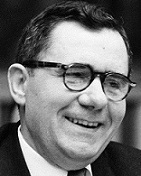
Foreign minister Gromyko Kosygin's 1964 reforms which he supported were subverted by Brezhnev. He was more diplomat than bureaucrat. Not a leader, but smart and principled. Gorbachev foolishly retired him, the only competent one left.
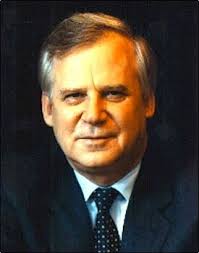 Ryzhkov A real worker-intellectual, a welder turned industry titan, against Yeltin-Yavlinsky's 500 days plan , which Gorbachev refused and then accepted, the shock therapy that became the norm in Russia and eastern Europe. Elected to the State Duma as an independent in 1995, Ryzhkov subsequently led the Power to the People block, later becoming the formal leader of the People's Patriotic Union of Russia alongside Gennady Zyuganov. Member of the Federation Council in 2003.
Ryzhkov A real worker-intellectual, a welder turned industry titan, against Yeltin-Yavlinsky's 500 days plan , which Gorbachev refused and then accepted, the shock therapy that became the norm in Russia and eastern Europe. Elected to the State Duma as an independent in 1995, Ryzhkov subsequently led the Power to the People block, later becoming the formal leader of the People's Patriotic Union of Russia alongside Gennady Zyuganov. Member of the Federation Council in 2003.
That's my kind of guy. A real communist, two orders of Lenin and two Red Banners for Labour (so there, Gorby), stuck it through the Gorbachev insanity, helped Armenia after the earthquake in 1988 (National Hero of Armenia), modest, no lust for power. In 2004, the Ukrainian Government awarded him the Order of Prince Yaroslav the Wise, 5th class, "for his outstanding contribution to the development of Russian-Ukrainian cooperation." Due to the Crimean crisis, he was sanctioned by Canada and the United States on March 17, 2014.
Sanctioned by Canada -- sock it to 'em, Kolya! No touchy feely tours of Canadian cattle and pig farms with Liberal Eugene Whelan, like MS in 1982. But his genuine beliefs and inability to toady prevented his rise to the coveted spot that MS snagged. Gorbachev treated Ryzhkov and his reform attempts just as badly as Leonid Brezhnev treated Alexei Kosygin, over the 1965 Soviet economic reform.
 Ligachev was principled, the only really intelligent, vocal critic of the mess. He unsuccessfully challenged MS for the office of gen-sec in 1990, MS holding on to it despite (or because of) his plan to destroy the party as the glue holding the country together, and finally abandoned Gorbachev. After 1991, Ligachev was elected three times to the Russian State Duma as a member for the Communist Party of the Russian Federation, a position he currently holds, and became the Duma's oldest member. Ligachev released his memoirs, Inside Gorbachev's Kremlin, in 1996.
Ligachev was principled, the only really intelligent, vocal critic of the mess. He unsuccessfully challenged MS for the office of gen-sec in 1990, MS holding on to it despite (or because of) his plan to destroy the party as the glue holding the country together, and finally abandoned Gorbachev. After 1991, Ligachev was elected three times to the Russian State Duma as a member for the Communist Party of the Russian Federation, a position he currently holds, and became the Duma's oldest member. Ligachev released his memoirs, Inside Gorbachev's Kremlin, in 1996.
How about the notorious Nina Andreyeva, a lowly chemistry teacher whose heartfelt letter, raising the alarm in 1988 to Sovietskaya Rossiya, with her bombshell I Cannot Forsake My Principles. Gromyko loved it. There were the makings of an attempt to oust MS. Alerted to Nina's 'hundred flowers' letter denouncing Mao (sorry, Gorby), Ligachev
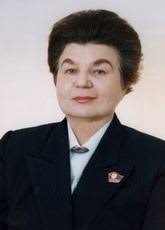 latched on to her while Gorbachev was on one of his countless trips, this time to Yugoslavia. But Ligachev got cold feet, didn't take the long pass and run. He was too nice (not a compliment for a communist or any politician). There was no method to the protests. MS had wormed his way to the top and had his own version of the 'hundred flowers'. When MS returned, he and Yeltsin (still a team) berated Ligachev, launched an attack on poor Nina and she was buried.
latched on to her while Gorbachev was on one of his countless trips, this time to Yugoslavia. But Ligachev got cold feet, didn't take the long pass and run. He was too nice (not a compliment for a communist or any politician). There was no method to the protests. MS had wormed his way to the top and had his own version of the 'hundred flowers'. When MS returned, he and Yeltsin (still a team) berated Ligachev, launched an attack on poor Nina and she was buried.
Taubman even suggests that a coup could have succeeded in 1990 if MS had barged ahead more quickly and not let Yeltsin loose.+ Maybe that would have been a good idea.
All of Gorby's critics continued their lives in politics after 1991 and were respected and even honoured, unlike Gorbachev, who had neither the intellectual capacity of Mlynar nor the political smarts of Yeltsin, nor any real ideology beyond ‘nice’.
Phony coup
Taubman (and not only) also argues that MS allowed the coup. Everyone knew about it. Taubman explains: if it worked, they could tighten up the ship and MS could return to power later. If it didn’t work, and collapsed, he would be welcomed back. That doesn't jell.
The coup was a set up, the Manchurian Candidate's 9/11, but Taubman fails to see that it was Gorbachev giving the hard-liners the rope to hang themselves, to destroy the party. Gorbachev was living in such a fantasy land that he failed to see that this was his own (and the SU’s) demise. A Manchurian boo-boo. US military strategy: destroy the village to save it.
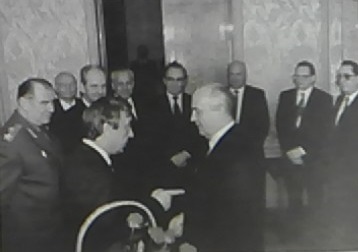 The plotters, led by Varennikov, argued this in court, pointing to his undeclared alliance with them throughout the winter and spring of 1991. They thought he wanted the coup. ‘We never discussed what we’d do if Gorbachev didn’t accept our proposals,’ lamented Varennikov. It's like the boy making a date, coming to pick up his beloved, and finding she got cold feet, instead her brother waiting with a hammer, laughing at his gullibility.
The plotters, led by Varennikov, argued this in court, pointing to his undeclared alliance with them throughout the winter and spring of 1991. They thought he wanted the coup. ‘We never discussed what we’d do if Gorbachev didn’t accept our proposals,’ lamented Varennikov. It's like the boy making a date, coming to pick up his beloved, and finding she got cold feet, instead her brother waiting with a hammer, laughing at his gullibility.
MS would not have risked his dear Raisa's nerves unless he was sure they were not going to be shot. His political acumen worked (for once), if for the wrong reasons. He was able to get Yeltsin to destroy the party, though he idiotically expected Yeltsin to work with him again to save the union. No dice. Control of Russia was quite enough for Yeltsin, and despite the overwhelming wish of all Soviets but the Balts, Armenians and Georgians to keep the union in the March referendum on maintaining the union, he sabotaged MS's final efforts to hold the system together.++
Gobachev could have arrested the coup delegation that came to see him at his dacha Zarya (Dawn) at Foros. He had 32 armed guards (were they loyal? but, at that point, did he even need them?). The plotters failed to seize the day, and so did Gorbachev on his return. He missed a vital meeting to show he was back in control because his beloved Raisa had a fit of nerves.
The only honorable would-be coupmakers were Pugo internal affairs (shot himself and wife), Akhromeyev (I can no longer live when my Fatherland is dying and everything I have worked for is being destroyed.’ hanged in his office), and Varennikov who refused to accept amnesty and argued his defence (Gorbachev was called to testify) and was acquitted, along with Yazov and Yanayev. Varennikov, like Ryzhkov and Ligachev, was elected deputy of the State Duma in 1995. In 2003 he joined the Rodina bloc as one of its leaders.
But these bumbler coupmakers look more like second-tier heroes, a pretty sorry lot, muppets, according to Ambassador Braithwaite's wife Jil, Marx Brothers, according to Scowcroft. They were the only hardliners who could tolerate and be tolerated by MS by the end, surrounded as he was by sycophants and incompetent 'critics'. Among the plotters, Yanayev was much like MS, only a trade union hack as opposed to a komsomol one. He's down with MS and Yeltsin in Dante's 9th circle with traitors Brutus, Judas, and Cassius. Raisa is probably in Circle 2 now, with lovers who get tragically mixed up in love and politics.
I remember vividly turning on Channel 1 Moskva the night of August 19, 1991. Chopin's funeral march and a subdued woman announcing the resignation of MS. Chills running up my spine. Scrambling on top of a burnt out trolleybus in front of the White House. Then, suddenly, Gorby and Raisa waving from their plane. Apparently MS pausing a moment, turning to Raisa, saying, ‘We’re flying to a new country. I want to breathe the air of freedom in Moscow.’ Wow. What a dead giveaway. He was returning to hellfire. A long, excruciating perestroika/glasnost hangover. A new country, indeed.
xxx
*Aleksandr died in 2001, age 55. There is nothing about him in Taubman, in any writings by MS.
**And who was purged, became a noted entomologist, signed Charter 77, and emigrated to Austria to teach. He wrote up his experiences in Nightfrost in Prague: The End of Humane Socialism (1980). Apparently the two old buddies never met up again. Like Gorbachev, who ran a quixotic campaign in 1996 against Yeltsin and was ridiculed and scraped up only a few %, in 1996, Mlynar also ran election to the Czech parliament, as a candidate for the democratic socialist Left Bloc party, but was defeated and died in 1997.
***William Taubman, Gorbachev: His life and ties, WW Norton, 2017, 215, 269.
****ibid., 189, 257, 347.
+ibid., 347.
++Taubman doesn't mention the most endearing legacy of Gorbachev: the March 17, 1991 referendum. The question put to voters was: Do you consider necessary the preservation of the Union of Soviet Socialist Republics as a renewed federation of equal sovereign republics in which the rights and freedom of an individual of any ethnicity will be fully guaranteed? Of course it was boycotted in the Baltics, Armenia, Georgia (though not the breakaway province of Abkhazia, where the result was over 98% in favour, and in South Ossetia), and Moldova. But turnout was 80% across the rest of the Soviet Union. The referendum's question was approved by nearly 70% of voters in all nine other republics that took part. It was the only referendum in the history of the Soviet Union, as the August coup prevented the formation of the renewed federation, causing the Soviet Union to be dissolved on December 26, 1991.
xxx
What is Gorbachev's personality type?
Putting on my Freud cap for a moment, why did MS bring Yeltsin from Siberia, a power-hungry reformer like him, and keep him, putting up with his tricks, his insults? And at the same time, Ligachev, a true blue hardliner, watching them slug it out like gladiators in the coliseum? And compare Putin to his beloved 'statesmen' Reagan and Thatcher? And then spurn him, and then embrace him again, like a temperamental jilted lover?
And add in his beloved beloved, Raisa, bringing her to Reykjavik for photo ops (no Nancy there, 'a woman must know her place'). Shades of Hillary. And their daughter Irina, and her two daughters. MS lived in a world dominated by women. He was the passive apparatchik, always compromising, he cried easily watching sentimental movies, very much like a woman. He craved the manly courage that he saw in Reagan/ Thatcher and Yeltsin/ Ligachev/ Putin, the authoritarian czar that Raisa and Irina would not approve of.





